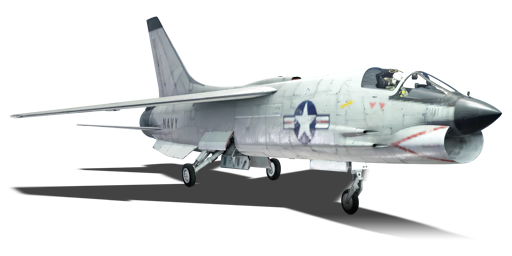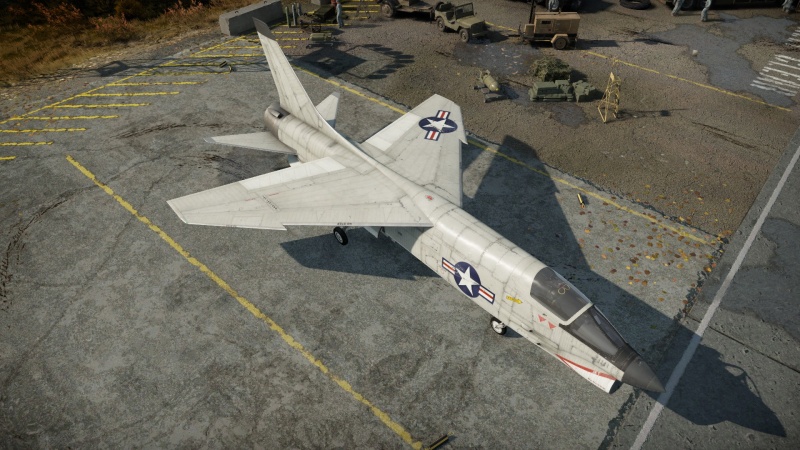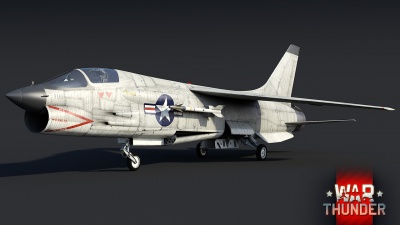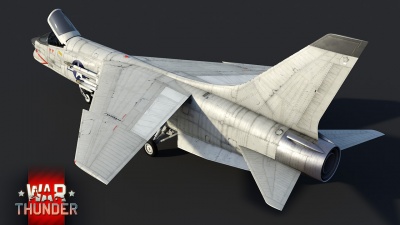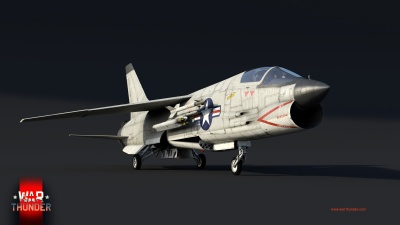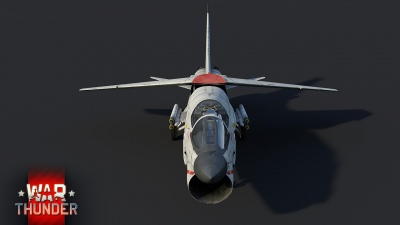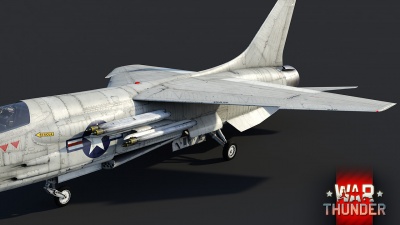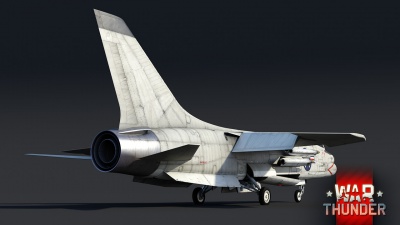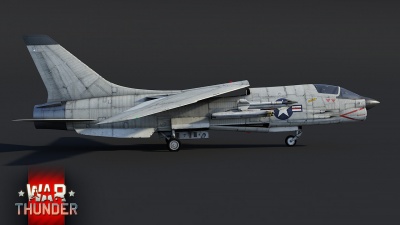Difference between revisions of "F8U-2"
(according to flight-model files flaps limit is 1070, not 1071: "FlapsDestructionIndSpeedP1": [0.2,1070.0]) |
|||
| Line 54: | Line 54: | ||
! Combat !! Take-off !! Landing !! + !! - | ! Combat !! Take-off !! Landing !! + !! - | ||
|- | |- | ||
| − | | <!-- {{Specs|destruction|body}} --> 1555 || {{Specs|destruction|gear}} || | + | | <!-- {{Specs|destruction|body}} --> 1555 || {{Specs|destruction|gear}} 428 || 1070 || N/A || 583 || ~11 || ~7 |
|- | |- | ||
|} | |} | ||
Revision as of 10:59, 16 March 2021
Contents
Description
The F8U-2 Crusader II is a rank VI American jet fighter with a battle rating of 9.7 (AB), 10.3 (RB), and 10.0 (SB). It was introduced in Update "Ixwa Strike".
General info
Flight performance
Describe how the aircraft behaves in the air. Speed, manoeuvrability, acceleration and allowable loads - these are the most important characteristics of the vehicle.
| Characteristics | Max Speed (km/h at 10,668 m) |
Max altitude (metres) |
Turn time (seconds) |
Rate of climb (metres/second) |
Take-off run (metres) | |||
|---|---|---|---|---|---|---|---|---|
| AB | RB | AB | RB | AB | RB | |||
| Stock | 2,025 | 2,017 | 16310 | 28.4 | 29.4 | 113.8 | 104.6 | 1,828 |
| Upgraded | ___ | ___ | __._ | __._ | __._ | __._ | ||
Details
| Features | |||||
|---|---|---|---|---|---|
| Combat flaps | Take-off flaps | Landing flaps | Air brakes | Arrestor gear | Drogue chute |
| ✓ | X | ✓ | ✓ | ✓ | X |
| Limits | ||||||
|---|---|---|---|---|---|---|
| Wings (km/h) | Gear (km/h) | Flaps (km/h) | Max Static G | |||
| Combat | Take-off | Landing | + | - | ||
| 1555 | 428 428 | 1070 | N/A | 583 | ~11 | ~7 |
| Optimal velocities (km/h) | |||
|---|---|---|---|
| Ailerons | Rudder | Elevators | Radiator |
| < 1000 | < 590 | < 500 | N/A |
Survivability and armour
Examine the survivability of the aircraft. Note how vulnerable the structure is and how secure the pilot is, whether the fuel tanks are armoured, etc. Describe the armour, if there is any, and also mention the vulnerability of other critical aircraft systems.
Modifications and economy
Armaments
Offensive armament
The F8U-2 is armed with:
- A choice between two presets:
- 4 x 20 mm Browning-Colt Mk12 Mod 3 cannons, nose-mounted (144 rpg = 576 total)
- 4 x 20 mm Browning-Colt Mk12 Mod 3 cannons, nose-mounted (144 rpg = 576 total) + 32 x FFAR Mighty Mouse rockets
Suspended armament
The F8U-2 can be outfitted with the following ordnance:
- Without load
- 2 x AIM-9B Sidewinder missiles
- 4 x AIM-9B Sidewinder missiles
- 2 x AIM-9D Sidewinder missiles
- 4 x AIM-9D Sidewinder missiles
- 4 x Zuni Mk32 Mod 0 ATAP rockets
- 8 x Zuni Mk32 Mod 0 ATAP rockets
- 2 x AIM-9B Sidewinder missiles + 4 x Zuni Mk32 Mod 0 ATAP rockets
- 2 x AIM-9D Sidewinder missiles + 4 x Zuni Mk32 Mod 0 ATAP rockets
Usage in battles
The F8U-2 performs the best when using tactics similar to the Hunter, which involves using your high-speed pointing and handling to break the enemy formation. However, be sure not to engage in a close combat when your speed is 900 km/h or above, since there is a great risk that your wing would break due to the overload.
The most dangerous enemies include:
- Any soviet aircraft that has an R-60: since it would be impossible to dodge the missile at high speed.
- MiG-17s: they can outmanoeuvre you in dogfights.
Radars
The F8U-2 is equipped with an AN/APQ-50 search and tracking radar. The radar is mounted in the nose of the aircraft.
| AN/APQ-50 - Target Detection Radar | |||
|---|---|---|---|
| Maximum Detection Range |
Guaranteed Detection Range |
Max Azimuth Scan Angle |
Max Elevation Scan Angle |
| 370,000 m (theoretical) |
40,000 m | ±50.0° | -8.15°/+4.15° |
| AN/APQ-50 - Target Tracking Radar | |||
| Maximum Tracking Range |
Minimum Tracking Range |
Azimuth Tracking Angle |
Elevation Tracking Angle |
| 92,500 m | 200 m | ±58.0° | ±58.0° |
Pros and cons
Pros:
- Cannons could fire separately to save ammo
- Four AIM-9Ds, good when engaging enemies at about 3 km
- Excellent flight performance
- Excellent pointing at high speed
- Landing flaps provide a lot of lift thanks to the variable wing design
- Extendable rocket pod which fires 16 Mighty Mouses at once
Cons:
- Extremely fragile, can crash under 11G overload
- Cannot break the sound barrier at low altitude
- Incredibly likely to set on fire because of the fuel placement
History
Devblog
In 1952, the American Naval command announced requirements for a new supersonic jet carrier-based fighter to protect carrier groups from enemy aircraft and achieve air superiority. Chance Vought Aircraft Inc., which already had considerable experience working with carrier-based aircraft, became one of the participants in the competition. Their candidate differed from the competition by a variable-incidence wing. The wing tilted upward by 5 degrees, which noticeably improved taking off and landings on short decks of aircraft carriers.
Just 20 months after receiving the contract, the first prototype was built for tests. The fighter successfully passed the initial tests, in the very first flight it easily broke the sound barrier, and in a modified form went to the navy for deck tests. The first prototype series was successfully tested on aircraft carriers in the spring of 1956, after which the F8U-1 Crusader entered service with the US Navy. Work on a promising jet fighter did not stop after the start of mass production. The modified aircraft with a new power plant, advanced navigation system, radar, FCS and improved armament received the designation F8U-2.
The Crusader has become a real legend and a symbol of US carrier-based aviation for its excellent flight characteristics, ease of operation, reliability and significant firepower. The fighter received the baptism of fire almost immediately after entering the service, and since then has been actively used in combat and training missions in many parts of the world, including intensive combat service in Vietnam. Even when more advanced aircraft entered service, the naval pilots were reluctant to say goodbye to the Crusaders. “When you're out of F-8's, you're out of fighters” they said.
Media
See also
Links to the articles on the War Thunder Wiki that you think will be useful for the reader, for example:
- reference to the series of the aircraft;
- links to approximate analogues of other nations and research trees.
External links
Paste links to sources and external resources, such as:
- topic on the official game forum;
- other literature.
| USA jet aircraft | |
|---|---|
| Fighters | |
| F9F | F9F-2 · F9F-5 · F9F-8 |
| F-80 | F-80A-5 · F-80C-10 |
| F-84 | F-84B-26 · F-84F · F-84G-21-RE |
| F-86 | F-86A-5 · F-86F-25 · F-86F-2 · F-86F-35 |
| F-89 | F-89B · F-89D |
| F-100 | F-100D |
| F-104 | F-104A · F-104C |
| F-4 | F-4C Phantom II · F-4E Phantom II · F-4J Phantom II · F-4S Phantom II |
| F-5 | F-5A · F-5C · F-5E · F-20A |
| F-8 | F8U-2 · F-8E |
| F-14 | F-14A Early · ▄F-14A IRIAF · F-14B |
| F-15 | F-15A · F-15C MSIP II · F-15E |
| F-16 | F-16A · F-16A ADF · F-16C |
| Other | P-59A · F2H-2 · F3D-1 · F3H-2 · F4D-1 · F11F-1 |
| Strike Aircraft | |
| FJ-4 | FJ-4B · FJ-4B VMF-232 |
| A-4 | A-4B · A-4E Early |
| A-7 | A-7D · A-7E · A-7K |
| AV-8 | AV-8A · AV-8C · AV-8B Plus · AV-8B (NA) |
| A-10 | A-10A · A-10A Late · A-10C |
| F-111 | F-111A · F-111F |
| Other | A-6E TRAM · F-105D · F-117 |
| Bombers | |
| B-57 | B-57A · B-57B |


